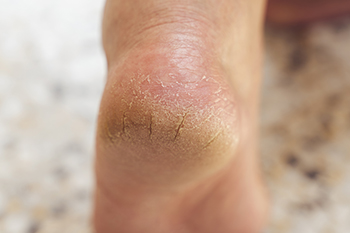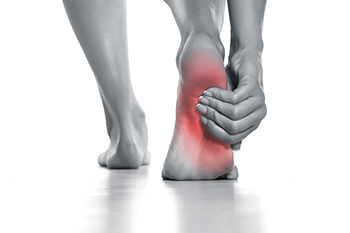Flint Office
1303 S. Linden Rd., Suite D
Flint, MI 48532

Wearing high heels can dramatically change the way a person walks by shifting the body’s weight forward and placing extra pressure on the front of the foot. This altered gait can lead to shorter steps and reduced balance, increasing the risk of stumbling or falling. In the short term, high heels often cause blisters, corns, and pain due to pressure and friction. The risk of ankle sprains also rises as the elevated heel makes the ankle less stable on uneven surfaces. Over time, consistent use of high heels may lead to the shortening of the Achilles tendon, which can result in stiffness or pain even when not wearing heels. Additionally, long-term wear can also affect posture and spine alignment, contributing to discomfort and musculoskeletal strain throughout the body. If you have foot pain from wearing high heels, it is suggested that you schedule an appointment with a podiatrist who can treat various foot conditions, and guide you on suitable heel choices.
High heels have a history of causing foot and ankle problems. If you have any concerns about your feet or ankles, contact one of our podiatrists from Community Podiatry Group. Our doctors can provide the care you need to keep you pain-free and on your feet.
Effects of High Heels on the Feet
High heels are popular shoes among women because of their many styles and societal appeal. Despite this, high heels can still cause many health problems if worn too frequently.
Which Parts of My Body Will Be Affected by High Heels?
What Kinds of Foot Problems Can Develop from Wearing High Heels?
How Can I Still Wear High Heels and Maintain Foot Health?
If you want to wear high heeled shoes, make sure that you are not wearing them every day, as this will help prevent long term physical problems. Try wearing thicker heels as opposed to stilettos to distribute weight more evenly across the feet. Always make sure you are wearing the proper shoes for the right occasion, such as sneakers for exercising. If you walk to work, try carrying your heels with you and changing into them once you arrive at work. Adding inserts to your heels can help cushion your feet and absorb shock. Full foot inserts or metatarsal pads are available.
If you have any questions please feel free to contact our office located in Flint, MI . We offer the newest diagnostic and treatment technologies for all your foot and ankle needs.

Cracked heels, or heel fissures, occur when the skin on the bottom of the feet becomes excessively dry and splits under pressure. Initially, these cracks may be superficial, causing minimal discomfort. However, without proper care, heel fissures can deepen, leading to pain, bleeding, and an increased risk of infection. Factors contributing to cracked heels include prolonged standing, wearing open-back shoes, walking barefoot, obesity, and medical conditions such as diabetes. Symptoms often involve discomfort while standing or walking, itching, and visible flaking of the skin. To address this issue, a podiatrist can remove thickened skin, apply dressings to minimize skin movement, and recommend appropriate footwear to alleviate pressure on the heels. If you have painful heel fissures, it is suggested that you schedule an appointment with a podiatrist for an exam and appropirate treatment.
If the skin on your feet starts to crack, you may want to see a podiatrist to find treatment. If you have any concerns, contact one of our podiatrists from Community Podiatry Group. Our doctors can provide the care you need to keep you pain-free and on your feet.
Cracked Heels
It is important to moisturize your cracked heels in order to prevent pain, bleeding, and infection. The reason cracked heels form is because the skin on the foot is too dry to support the immense pressure placed on them. When the foot expands, the dry skin on the foot begins to split.
Ways to Help Heal Them
Ways to Prevent Cracked Heels
If you are unsure how to proceed in treating cracked heels, seek guidance from a podiatrist. Your doctor will help you with any questions or information you may need.
If you have any questions, please feel free to contact our office located in Flint, MI . We offer the newest diagnostic and treatment technologies for all your foot care needs.

Arch pain can affect people of all activity levels. The arch of the foot supports body weight, absorbs impact, and helps stabilize movement. Pain in this area may be linked to plantar fasciitis, the most common cause, where the ligament connecting the heel to the toes becomes inflamed from overuse or strain. Another cause of arch pain is posterior tibial tendon dysfunction, which occurs when the tendon that supports the arch weakens or becomes injured. Cavus foot, a condition involving unusually high arches, may lead to instability and pressure-related discomfort. Overpronation, where the foot rolls inward excessively while walking, can also place undue stress on the arch and nearby joints. Risk factors such as weight gain, aging, and repetitive stress on the feet may contribute to these conditions. Arch pain is sometimes felt in the heel, ball of the foot, or ankle, and may worsen during or after standing or walking. If you have pain in the arch of your foot, it is suggested that you schedule an appointment with a podiatrist for an exam and appropriate treatment.
Foot Pain
Foot pain can be extremely painful and debilitating. If you have a foot pain, consult with one of our podiatrists from Community Podiatry Group. Our doctors will assess your condition and provide you with quality foot and ankle treatment.
Causes
Foot pain is a very broad condition that could be caused by one or more ailments. The most common include:
Diagnosis
To figure out the cause of foot pain, podiatrists utilize several different methods. This can range from simple visual inspections and sensation tests to X-rays and MRI scans. Prior medical history, family medical history, and any recent physical traumatic events will all be taken into consideration for a proper diagnosis.
Treatment
Treatment depends upon the cause of the foot pain. Whether it is resting, staying off the foot, or having surgery; podiatrists have a number of treatment options available for foot pain.
If you have any questions, please feel free to contact our office located in Flint, MI . We offer the newest diagnostic and treatment technologies for all your foot care needs.